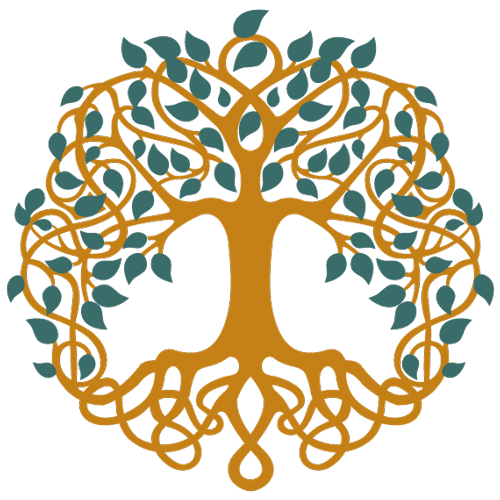Look around. The air hums with the latest decrees of power—edicts penned with the ink of extraction, each stroke unraveling ecosystems, displacing kin, widening the wound between human and more-than-human worlds. A calculated chaos, always at the greatest expense to the Earth and those who live in closest communion with her.
In a time of unmaking, stillness is resistance.
To refuse the frenzied pace, to move in rhythm with the land rather than the market, is to begin dismantling the machine from within. Here, in the quiet, something ancient stirs. Here, rebellion becomes renewal. A rhythm of root and river, of moon-pulled tides and the long breath of the land exhaling in winter. A rhythm that belongs not to markets but to mycelium, to the slow decay that feeds new life. But capitalism—and its shadowed twin, fascism—have severed us from these living cadences, replacing them with the mechanical drumbeat of productivity. Produce. Consume. Obey. Even as the world burns, the machine demands more.
But what if we stopped marching to its hollow rhythm?
Soft rebellion steps outside this cadence. It slows, it lingers, it refuses to be optimized. It is not the riot of shattered glass but the quiet insurgency of slowness—of hands in soil, of afternoons lost to storytelling, of tending life without the urgency of extraction. It is the whispered spell of refusal, the breath between tasks, the choice to listen to the land rather than the clock.
The machine thrives on exhaustion. It keeps us too tired to resist, too drained to dream of another way. But what happens when we stop feeding it? When we carve out spaces of unproductive time, when we sink our hands into the earth and remember? This is the rebellion of rest, of care, of weaving ourselves back into the unseen threads of a world that has never forgotten us.
To slow is to disrupt. To rest is to reclaim. To step out of the machine’s momentum is to remember that we are not cogs, not tools, but kin to the wind and the rivers, to the fungi and the forest. What if we let that web hold us? What if we trusted slowness to guide us home?
Here, in the soft rebellion of refusal, the future hums—rooted, unrushed, waiting for us to listen.
Building Community Through Intentional Resistance
The machine isolates. It fractures, it extracts, it forces us to see one another as competition rather than kin. But slowness stitches us back together. Resistance is not only found in marches and manifestos—it is in the soil beneath our fingernails, in the meals shared without hurry, in the tending of a world that has always been alive.
Tending Communal and Wild Bounty
To plant a garden is to defy the machine’s hunger. To share seeds, to forage, to nurture the slow ripening of fruit—these are acts of devotion to the more-than-human world, to the rhythms of decay and renewal. When we feed each other outside the grasp of industry, we remember that sustenance was never meant to be a commodity but a covenant.
Mutual Aid as an Ecosystem of Care
The forest does not hoard. Trees send sugars to their ailing kin through the mycelial web, rivers give themselves to the sea. The machine demands competition, but the earth teaches us reciprocity. By forming mutual aid networks, by redistributing resources, by leaning into the slow, interwoven strength of community, we disrupt the scarcity myth that capitalism feeds upon.
Weaving Alternative Economies
Fast money comes at the cost of slow life. But what if we built economies that honored reciprocity over profit? What if we included an eco-sensuality that included regenerative practices? Cooperatives, barter systems, up-cycling, recycling, community-supported agriculture—these are not just financial shifts but ritual acts of return. They tether us back to a world where worth is measured in mycelial care rather than currency, where survival is not a transaction but a shared responsibility.
Unplugging from the Machine: A Digital Detox
The machine’s tendrils extend into our minds, colonizing our attention, fragmenting our presence. But slowness calls us back to embodiment.
Scheduled Digital Sabbaticals
To step away from the screen is to step back into the world of wind and birdsong, of rain-slicked leaves and the hush of snowfall. It is a return to the sensuous, to the unquantifiable magic of being alive. Set aside hours, days, moments where no algorithm dictates your gaze—where your senses belong to the world, not the market.
Cultivating Craft as Ritual
To create by hand—whether writing, weaving, carving, or kneading dough—is to participate in the sacred slowness of making. The loom, the pen, the potter’s wheel—all of these resist the machine’s hunger for speed. They remind us that creation is not a product but a process, an act of reverence for the materials we shape and the stories they hold.
Transforming Policy Through the Politics of Slow
Slowness is not just personal—it is deeply political. A world built on exhaustion is a world easy to control. By embedding slow living into our activism, we plant the seeds of a society that values well-being over extraction.
Advocating for Work-Life Reforms
Rest is not a luxury; it is a birthright. Fighting for shorter workweeks, guaranteed rest, and protections against burnout is not just about comfort—it is about dismantling a system that feeds on depletion. Every demand for slowness is a fracture in the machine’s foundation.
Creating Spaces for Reflective Resistance
Change does not come from urgency alone. It also comes from dreaming, from deep thinking, from gathering in places where time stretches and new worlds can be imagined. Host teach-ins, hold story circles, reclaim public spaces for slow dialogue. Let resistance be a place of deep-rooted thought, not just reaction.
The Sacred Rhythm of Rebellion
Soft rebellion is not retreat—it is a return. A return to the slow intelligence of forests and fungi, of root and rock, to the cyclical wisdom of the moon, the spirits of the Earth and the ancestors of kith and kin, to the understanding that nothing in nature rushes toward its own destruction.
In every unhurried breath, every shared moment of rest, every act of care that refuses to be monetized, we weave ourselves back into the great, animate web of the world. This is resistance. This is magic.
This is our call to arms—not with force, but with slowness, with softness, with the unwavering refusal to be anything less than fully alive.
In slowing down, we do not fall behind. We step forward—toward kinship, toward liberation, toward home.





